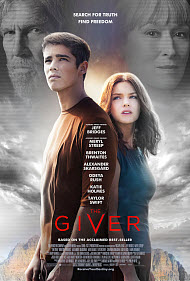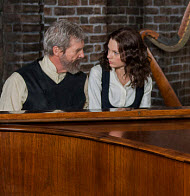The Giver
 for a mature thematic image and some sci-fi action/violence.
for a mature thematic image and some sci-fi action/violence.
Reviewed by: John Decker
CONTRIBUTOR
| Moral Rating: | Better than Average |
| Moviemaking Quality: |
|
| Primary Audience: | Teens Adults Family |
| Genre: | Sci-Fi Drama Adaptation |
| Length: | 1 hr. 34 min. |
| Year of Release: | 2014 |
| USA Release: |
August 15, 2014 (wide—3,003 theaters) DVD: November 25, 2014 |








Is it necessary to give up humanity’s emotions in order to have a stable society?
Can humans by themselves ever create a true Utopia? The answer is no. Only God is capable of that, and He is promised paradise for those who follow Him.
What is the true source of human UNHAPPINESS? Answer: Sin and separation from our Creator
What brings true human HAPPINESS? What is our future when we fully acknowledge our sinful nature and accept Jesus Christ’s gracious payment of the penalty for our sins, trusting fully in Him? See: Eternal life v. eternal death

euthanasia
murder of babies that are not developing according to expectations—See: “The deformed or handicapped child—Is it better for them never to be born?” Answer

Who truly has the right to decide what is right and wrong? Ourselves? Or our Creator?
How do I know what is right from wrong? Answer
How can I decide whether a particular activity is wrong? Answer
Are we living in a moral Stone Age? Answer
What do you think of this movie’s comment that where there’s good, there’s also bad? See: Sin and the fall of man, and about goodness and righteousness.
What do you think about the film’s comment that when people are given the “freedom to choose, they choose wrong”? See: The Fall of Man
Do NOT click on this button
PAIN, SADNESS, WAR—Did God make the world the way it is now? What kind of world would you create? Answer
ORIGIN OF BAD—How did bad things come about? Answer
Why does God allow innocent people to suffer? Answer
What about the issue of suffering? Doesn’t this prove that there is no God and that we are on our own? Answer
Does God feel our pain? Answer
Are you good enough to get to Heaven? Answer

community based on lies and secrets
socialism
totalitarianism, totalitarian government / similarities to Communism
importance of our memory / forgotten memories
| Featuring |
|---|
|
Jeff Bridges … The Giver Meryl Streep … Chief Elder Brenton Thwaites … Jonas Alexander Skarsgård (Alexander Skarsgard) … Father Katie Holmes … Mother Odeya Rush … Fiona Cameron Monaghan … Asher Taylor Swift … Rosemary Emma Tremblay … Lilly See all » |
| Director |
| Phillip Noyce — “Salt” (2010), “The Bone Collector” (1999), “Patriot Games” (1992) |
| Producer |
|
Walden Media As Is Productions See all » |
| Distributor |
“Search for truth. Find freedom.”
The society which is built in “The Giver” is a Utopian society. It is kept in check by the ultimate computerized surveillance environment and is enabled by designer pharmaceuticals which narrow the human experience to something less than we are and something more like what we call happiness—when we’re not thinking of the deeper aspects with which God made us. [2]
I don’t want to describe the plot of this movie too much, because it is rather flat, but read on—I like this film. It would be very easy to give away much of this movie with a few strokes of the plastic keyboard. So in the spirit of avoiding movie trailers and allowing the cinematic experience to join you to the deeper meanings, I will not say much more about it.
This movie contains little to no offense; the only sexuality is some simple and innocent kisses of young love. I recall no vulgar language. It contains the brief violence of a single punch, a confrontation with shock weapsons, plus memories of war, a tornado and death. It contains much drug use which is never put in a good light. Unfortunately, it is the kind of drug use which we have compartmentalized, the kind we are conformed to, the kind administered by the architects of Utopia—administered in a sterile manner; it’s what the doctor ordered.
In the spirit of the job we all have, to be watchmen and the shepherds, I will say that “The Giver” is for the mature mind of any age who understands that the one God who made us has set before us life and death, commanding that we choose Him (Deut. 30:15-20).
“The Giver” falls short of being a cinematic masterpiece, but it is highly contemplative. I could easily see it being shown in churches, though some will find a rebellious fault.
It’s not a new thing to say that happiness is not God’s goal for us, that what He desires for us is no scratch on the surface moment-by-moment bicycle ride of smiles. From just below the surface of His dark, unseekable depths were drawn the puny cup of Plato’s lauded contemplations, the solace which Henry David Thoreau found in creation, the wheel within a wheel of incomprehensible natural mechanisms found in a single cell.[3] This film testifies to a truth, man was not furnished for simple happiness. Though we are instructed to enjoy life [1], I cannot at all recall where God praises a man for being simple.
I am not often given to the contortions which make every new movie something teachable from God’s Word. Much of this movie however is a tremendous illustration for the simple, for those dabbling in the politically correct, for those who put their trust in the might of governments and the numbing whispers of modern cerebral alchemy and for all of us who live among these swaying temptations. For “the turning away of the simple shall slay them, and the prosperity of fools shall destroy them” —Proverbs 1:32.
Indeed man, whom God made, has illustrated something powerful in this story; a story which has been met with complaints of being “preachy.” Indeed it preaches a sermon for today. I do not know fully the distinctions between rebellion and the shunning of oppression, between kissing the boot of tyranny and proper (Biblical) obedience to authority, but we are made in His image. Wisdom knows all this and more. My advice, pray for wisdom and watch this film.
Proverbs 14:15—The simple believeth every word: but the prudent man looketh well to his going.
Proverbs 9:1-5—Wisdom hath builded her house, she hath hewn out her seven pillars: She hath killed her beasts; she hath mingled her wine; she hath also furnished her table. She hath sent forth her maidens: she crieth upon the highest places of the city, Whoso is simple, let him turn in hither: as for him that wanteth understanding, she saith to him, Come, eat of my bread, and drink of the wine which I have mingled.
Scripture references:
Ecclesiastes 2:24—There is nothing better for a man, than that he should eat and drink, and that he should make his soul enjoy good in his labour. This also I saw, that it was from the hand of God.
Provers 18:4—The words of a man’s mouth are as deep waters, and the wellspring of wisdom as a flowing brook.
Psalm 92:5—O LORD, how great are thy works! and thy thoughts are very deep.
Deuteronomy 4:6—Keep therefore and do them; for this is your wisdom and your understanding in the sight of the nations, which shall hear all these statutes, and say, Surely this great nation is a wise and understanding people.
Violence: Moderate / Profanity: None / Sex/Nudity: Mild
 Discover God’s promise for all people—told beautifully and clearly from the beginning. Discover The HOPE! Watch it online, full-length motion picture.
Discover God’s promise for all people—told beautifully and clearly from the beginning. Discover The HOPE! Watch it online, full-length motion picture.
 Do you understand God’s Story? Take a multimedia journey through the Bible, from Creation to eternity. Hear and read an exciting summary of the Bible’s most important records, in chronological order.
Do you understand God’s Story? Take a multimedia journey through the Bible, from Creation to eternity. Hear and read an exciting summary of the Bible’s most important records, in chronological order.
See list of Relevant Issues—questions-and-answers.


That said I would give the film enough credit to say that a home DVD viewing would certainly not be a waste of time and would be a good family activity to stimulate discussion, if nothing more. I was intrigued by a focus on the preoccupation with the use of language in the script.
The main character points out what each of us need to be wary of in our own consumption of popular culture. In the movie, murder was called “going elsewhere”. At the risk of pointing out the all to obvious, politicians, advertisers and journalists ubiquitously spin webs of deceptive sophistry in our world, as well, to soften whatever delusion they are attempting to sell. Space here precludes further clarification that you’ll see in the movie, but this certainly was a HUGE practical nugget pointed out by the film, which makes the movie worth watching, if realization of this concept alone is gained. See all »
Moral rating: Better than Average / Moviemaking quality: 3
I really appreciated the acting by Brenton Thwaites and the stunningly beautiful Odeya Rush. There's a lot to be learned from the story about the utopian society that became Earth in the story. There is certainly lots of potential symbolism, Christian as well I think, but what I took from it was that we should cherish the gifts we have been given as a human race in our capacity to love, feel emotion and joy. Despite the evil in the world we would not want to give up our free-will, and as a society we should be making better choices so we don't lose that!
I am reminded of Psalm 36:9 “You are the giver of life. Your light lets us enjoy life.” (NCV) On a side note, a couple of Christmas songs were sung by the Von Trapp Children singing group who are Maria's great-grandchildren. There is definitely a Christian message at the end if you look for it.
Moral rating: Good / Moviemaking quality: 5
***SPOILER*** The elderly and weak babies are sent to “Elsewhere,” which basically means they are murdered by injection. It shows a baby being given an injection in the head, put in a box, and dumped down a chute. Anyone who considers having an abortion should watch this movie and imagine their baby on that table. Even if the circumstances surrounding the conception of the child was painful, the life that was created still has value and should be respected. ***END SPOILER*** ***I don’t recommend this movie for children, but I highly recommend it for older teenagers and adults.*** This movie is very similar to “Equilibrium” starring Christian Bale, but without the violence and rebellion. The only violence I could see were memories of war and one punch to the face. I didn’t hear any foul language, and there wasn’t any sex or nudity.
Moral rating: Excellent! / Moviemaking quality: 5
For example, no one cares about the romance between Jonah and his girlfriend. And why is Meryl Streep’s character so overbearing and hyper in her role as a leader, when we’re taught that this is a society where people don’t have passion or much in the way of emotion? If you’ve read the book, you’d know the only character anyone is going to care about is The Giver, himself, but like I’ve been saying, the main purpose of this science fiction story is supposed to be exploring this dystopian society. See all »
Moral rating: Better than Average / Moviemaking quality: 1½
Moral rating: Better than Average / Moviemaking quality: 5
Sound familiar (hint: their specialty is turning things upside down—James 1:17; Isaiah 10:13)? Yes, as usual, Hollywood is trying to make us think Satan is God, or at least better than God. When you accept his apple, sure, you’ll have to make a few sacrifices, but what you’ll gain is so much better! Perpetual illness!/Death!/War! Who wouldn’t want those, when offered the alternative of a peaceful, lovely forever?
Don’t be fooled by Tinseltown’s fancy footwork. They will have you dancing to their tune, and having you ask “Thank you, may I have another?” Sick! There’s a difference between saying, “Well, I like to go to the movies, and they’re ALL made by Hollywood. I know there are unsavory, un-Biblical elements, but this will be a diversion, and I get popcorn,” and falling for their lies—hook, line, and sinker. If you plan on going, please pray for discernment first.
Moral rating: Extremely Offensive / Moviemaking quality: 4
However, if you look for a biblical allegory, you will be disappointed. The double meanings in this story are more of a political kind, promoting faith, life and acceptance. Very inspiring and thought provoking.
Moral rating: Excellent! / Moviemaking quality: 5
Moral rating: Good / Moviemaking quality: 4½
PLEASE share your observations and insights to be posted here.



“The Giver” is based on Lois Lowry’s book of the same name and examines the future of society if this world continues to move in the direction it is currently heading. I have heard from various sources that the movie does not stay quite true to the original story and would, therefore, be disappointing to fans of the book.
However, as a movie, “The Giver” succeeds in communicating a poignant message that the postmodern world needs to hear. It examines the facets of human nature and deftly explores crucial themes such as the sanctity of human life, the centrality of choice, and the purpose of existence.
“The Giver” addresses the age-old question that the human race has been asking since the Garden of Eden: Why give humans the freedom of choice if they will tend to choose evil every time? This movie reminds us that life is not true life without choice. Without choice and the driving force of emotions, there can be no hate—but there can also be no love. In John 14:21, Jesus said, “Whoever has my commands and keeps them is the one who loves me. The one who loves me will be loved by my Father, and I too will love them and show myself to them.” In other words, those who love God will choose to obey him. If God had not given humans the choice to obey him in the Garden of Eden, humans would not have had the ability to love him or to love at all. Without love, what is life? See all »
My Ratings: Moral rating: Good / Moviemaking quality: 4